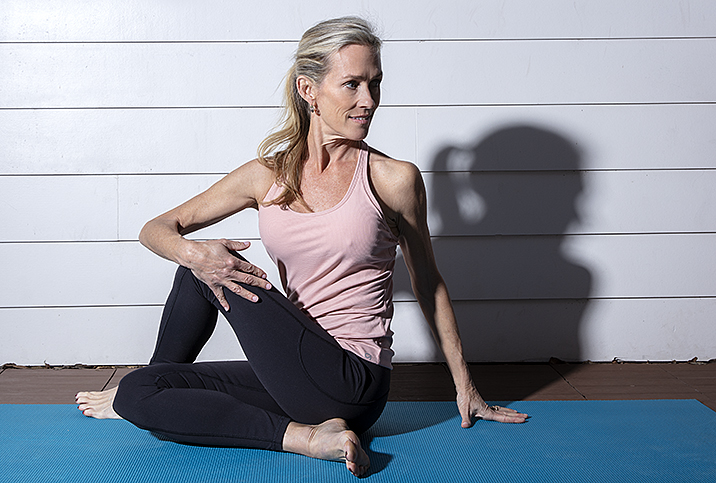Please Stop Believing These 9 Nutrition and Aging Inaccuracies

Aging gracefully typically involves a conscious effort to prioritize diet and nutrition. Both are crucial to maintaining overall health and vitality, and they can improve your sexual health, too.
Unfortunately, a number of myths concerning dietary misinformation are floating around online, with more popping up every day. The goal here is to offer helpful tips and advice, and hopefully illuminate new truths.
Inaccuracy #1
I don't need much food these days, I'm getting old.
Your body requires a carefully calibrated supply of nutrients to meet its dynamic energy demands. These demands differ by individual and age.
A common myth is that our need for food diminishes as we grow older, but the truth is less simple. Our metabolism naturally slows with age and our bodies may actually need more nutrients to maintain overall health.
"You need to continue eating sufficient amounts of protein and fats in your diet, especially as you age, for our fat deposition starts to wither—especially in our faces—and our hormonal production begins to decrease as well," said Lana Butner, N.D., L.Ac., a board-certified naturopathic doctor and licensed acupuncturist treating patients in New York City and Connecticut. "Also, protein is needed for strong bones, brain functioning, nerve conduction, mitochondrial health plus function and, of course, satiety."
Energy demands may amplify as we age and some older adults may be at a higher risk of nutrient deficiency, according to a 2006 study.
"One of the most common myths about nutrition as we age is that we don't need to eat as much," said Bria Gadd, a Toronto-based integrative nutritionist, holistic health coach and personal trainer who hosts "The Period Whisperer" podcast. "The truth is that we always need to eat for our specific body and energy demands. In fact, energy and health in our aging bodies can really be looked at as a supply-and-demand game. Are we supplying enough energy for the demands of our bodies?
"Of course, as we age, whether it be hormonal health or metabolic health, more energy is often required for our body to operate the way it once did."
Older people may need additional energy for a variety of functions, such as:
- Battling illnesses
- Maintaining sexual health
- Optimizing digestion
- Regulating hormones
"We can achieve this through added rest and optimal nutrition," Gadd said.
Inaccuracy #2
My diet is fine, I don't need to think about minerals, etc.
The cornerstone for nutrition as we age lies in micronutrients, primarily derived from vegetables. Consuming vegetables helps regulate our blood sugar levels and reduces the physical strain on our bodies.
One of the most essential micronutrients, as we age, is zinc. It can improve sexual function for both older men and postmenopausal women, according to a 2021 study on the effect of the mineral on postmenopausal women.
The supplementation of zinc, the study suggested, might do the following:
- Help improve orgasms and satisfaction
- Increase sexual desire and arousal
- Increase vaginal moisture
- Reduce pain during intercourse
Red meat and seafood are typically the best sources of zinc. If you're vegan or you worry about your weight, however, some low-calorie options rich in zinc include mushrooms, garlic, spinach, broccoli and kale.
Older people should consider calcium supplements to promote overall bone health. Keep in mind, though, this isn't guaranteed to prevent osteoporosis.
"While calcium is important for bone health, taking calcium supplements alone is not enough to prevent osteoporosis," said Johna Burdeos, R.D., a registered dietitian in Houston. "Older adults also need to ensure they are getting enough vitamin D, engage in regular weight-bearing exercise, and consume a balanced diet rich in other bone-supporting nutrients like magnesium, phosphorus and vitamin K."
Inaccuracy #3
I'm a vegetarian, I don't need to worry about protein.
"Being that protein is the building block for our muscle—which decreases more readily as we age—aiming for 20 to 30 grams of protein at each meal can make a significant difference in satiety, nutritional satisfaction and of course, energy levels," Gadd said.
And don't believe that older adults need less protein than younger adults.
"Older adults need the same amount of protein as younger adults to maintain muscle mass and strength," Burdeos said. "In fact, older adults may need even more protein to prevent muscle loss due to age-related changes."
Research published in 2021 suggested that older adults need 1.2 grams of protein per kilogram of body weight. That's to prevent the progression of sarcopenia, the muscle and bone loss that occurs with aging.
"That's higher than the recommended minimum of 0.8 grams of protein per kilogram of body weight," Burdeos added.
Inaccuracy #4
Who cares what I eat; I have lots of supplements.
Supplements may help older people absorb more essential nutrients, but that's not the whole story.
"While supplements can be helpful for some older adults who may have difficulty meeting their nutrient needs through diet alone, they should not replace a healthy diet," Burdeos said. "Nutrients are best absorbed from food. Dietary patterns have been shown to have a greater impact on overall health and longevity than supplements alone."
Inaccuracy #5
I eat some highly processed foods, but they're not that bad for you.
Abstaining from highly processed foods loaded with sugar, salt and saturated fats remains important. These foods can cause inflammation and oxidative stress. Those can reduce blood flow to the genitals and affect hormonal balance, leading to reduced libido and diminished sexual function.
Examples of highly processed foods include most fast food, frozen food, processed grains, sugary drinks and processed meats.
Eating too much highly processed food can increase one's risk of obesity, diabetes and cardiovascular diseases. All of these can hinder blood flow to the penis in men and contribute to erectile dysfunction (ED). For women, a diet deficient in healthy fats (such as omega 3) can result in vaginal dryness, which can cause sexual intercourse to be uncomfortable or painful and increase the risk of vaginal infections.
Highly processed foods common in Western diets may lead to faster cognitive decline as we age, according to a 2016 study.
Inaccuracy #6
My diet has nothing at all to do with my sexual health.
To help with sexual health, Butner recommended keeping a stash of snacks high in healthy fats and proteins.
"The more healthy fat you consume, the better your sexual hormones are going to respond and continue producing in adequate amounts," Butner said. "The same goes with your adrenal glands—also known as your stress hormone. All sex hormone production begins with cholesterol, so if you want to maintain a healthy libido, then fat is your friend.
"You cannot deprive your body of one of the three macronutrients that are responsible for not only hormonal production, but also that makes up a majority of your brain matter, allows for proper nerve conduction and signaling, and is a physiological requirement for all cellular membranes."
Inaccuracy #7
Now that I'm older than 60, there's no reason to change what I eat.
"Nutrition tips for improving sexual health in those over the age of 60 centers around improving the risk factors of chronic disease that lead to decreased blood flow," said Danine Fruge, M.D., the medical director of Pritikin Longevity Center in Miami.
She said it's important to take a few healthy measures through your diet:
- Improve blood pressure by lowering salt to less than 2,000 milligrams per day.
- Improve cholesterol by decreasing unnecessary fat.
- Improve blood sugar by cutting back on added starches, adding vegetables to meals and snacks, and minimizing pre-prepared meals and liquid calories such as soda, alcohol and juice.
Inaccuracy #8
I'm skinny. I can eat whatever I want to.
Just because you're not overweight, you can't simply eat anything without consequences.
"Normal weight and clothing size do not guarantee health," Fruge said. "A common health concern in thin people is called TOFI—which stands for 'thin outside, fat inside, also known as 'skinny fat.' This often occurs when we lose muscle and gain fat but still weigh the same—or less—and fit into our normal-sized clothes."
Too much body fat, regardless of an individual's weight, increases their risk of several conditions: heart disease, diabetes, stroke, kidney disease, sleep apnea and dementia.
"Muscle loss or sarcopenia is associated with decreased balance, increased risk of falls, bone loss, increased risk of fractures, loss of strength, decreased strength and mobility, and decreased quality of life," Fruge added.
Inaccuracy #9
What I eat has nothing to do with my heart or my quality of life.
The general recommendation is to focus on foods beneficial for the heart. A diet abundant in fruits, vegetables, whole grains, lean proteins and healthy unsaturated fats can improve heart health and blood flow throughout the body. This includes increased blood flow to the genitals, which improves overall sexual health.
To improve your quality of life and maintain overall vitality as you age, observe the following tips:
- Prioritize micronutrients.
- Maintain a steady intake of protein.
- Adopt a holistic approach to health that includes regular physical activity and a conscious effort to reduce processed food intake.
- Integrate proper rest, diet, exercise and mindful consumption.
The path to graceful aging is about balance. This means understanding and adapting to our body's evolving needs and making informed dietary choices for health, backed by valid sources.
It's never too late to adopt healthier habits
Whenever you make the decision to alter your diet and lifestyle for the better is the day when you will start your journey toward better health.
"While it's true that there are age-related and disease-related changes that we may not completely reverse, it's also true that practicing a healthy lifestyle can slow down the rate of damage from a chronic disease and buy us time to enjoy the fruits of our labor," Fruge said. "As knowledge and technology improves, we are learning how to mitigate the effects of aging and chronic disease."


















